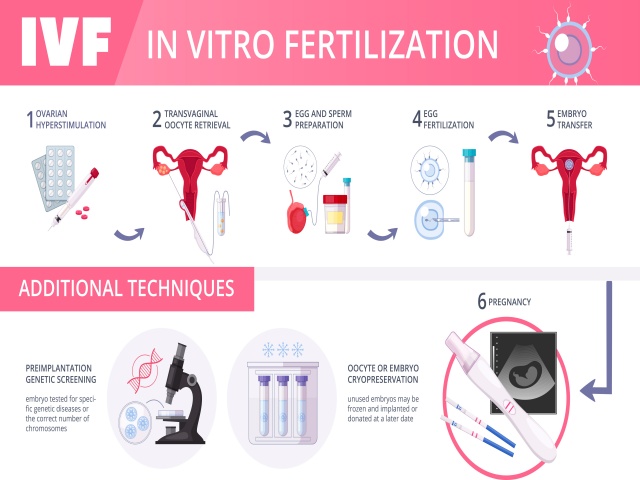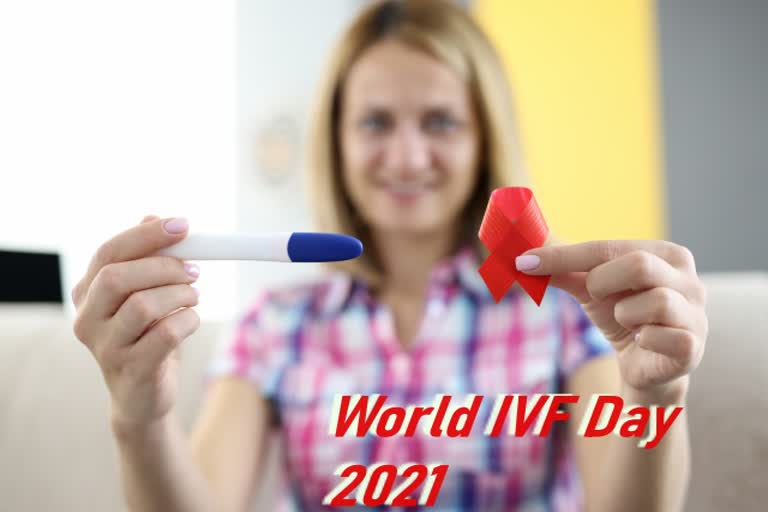What is IVF?
In vitro fertilization (IVF) is a complex series of procedures used to help with fertility or prevent genetic problems and assist with the conception of a child.

During IVF, mature eggs are collected (retrieved) from ovaries and fertilized by sperm in a lab. Then the fertilized egg (embryo) or eggs (embryos) are transferred to a uterus.
One full cycle of IVF takes about three weeks. Sometimes these steps are split into different parts and the process can take longer. IVF is the most effective form of assisted reproductive technology. The procedure can be done using your own eggs and your partner's sperm.
Your chances of having a healthy baby using IVF depend on many factors, such as your age and the cause of infertility. In addition, IVF can be time-consuming, expensive, and invasive. If more than one embryo is transferred to your uterus, IVF can result in a pregnancy with more than one fetus (multiple pregnancies).
Dr. S. Vyjayanthi, from Mother to be Fertility, KIMS Fertility Centre, explained the process of IVF and also for whom she recommends the treatment, and the recommendations are:
- Blocked Fallopian tubes
- Unexplained infertility-where routine tests do not indicate any abnormality in the couple
- Male factor severe abnormalities in the sperm parameters including very low sperm count/ motility
- Moderate/severe Endometriosis
- Advanced female age
- Poor ovarian reserve
History of IVF:
On July 25, 1978, Louise Joy Brown, the world’s first baby to be conceived via in vitro fertilization (IVF) is born at Oldham and District General Hospital in Manchester, England, to parents Lesley and Peter Brown.
The healthy baby was delivered shortly before midnight by cesarean section and weighed in at five pounds, 12 ounces.
Before giving birth to Louise, Lesley Brown had suffered years of infertility due to blocked fallopian tubes. In November 1977, she underwent the then-experimental IVF procedure.
A mature egg was removed from one of her ovaries and combined in a laboratory dish with her husband’s sperm to form an embryo.
The embryo then was implanted into her uterus a few days later.
Her IVF doctors, British gynecologist Patrick Steptoe and scientist Robert Edwards, had begun their pioneering collaboration a decade earlier.
Louise’s birth made headlines around the world and raised various legal and ethical questions. The Browns had a second daughter, Natalie, several years later, also through IVF.
In May 1999, Natalie became the first IVF baby to give birth to a child of her own. The child’s conception was natural, easing some concerns that female IVF babies would be unable to get pregnant naturally.
In December 2006, Louise Brown, the original “test-tube baby,” gave birth to a boy, Cameron John Mullinder, who also was conceived naturally.
WHO and IVF:
As per WHO, one in four couples of reproductive age in India faces difficulty in getting pregnant.
Since this comes with a lot of emotional and social stigma, a majority of couples are reluctant to discuss their fertility issues openly.
This hampers the possibility of timely diagnosis and treatment, according to Dr. Parul Katiyar, fertility consultant, Nova IVF.
The WHO estimates that there are between 120 and 160 million couples struggling with infertility worldwide.
IVF in India:
IVF is legal in India but there is still no specific law regarding IVF.
In the last 20 years, IVF treatment has gained a lot of public attention and thus it needs to be properly scrutinized when it comes to the legal and ethical aspects.
India the Union Government approved Assisted Reproductive Technology (ART) Regulation Bill 2020 allows the child born of IVF to enjoy all the rights as a natural biological child to protect the child from exploitation.
The bill also made it mandatory to conduct tests to identify the genetic defects in the embryos, to avoid any genetic diseases in the population born through these technologies.
In India, the success rate of IVF is 30% to 35% and for young women, it is 40%. According to the 228th Law Commission of India report, in 2009 the Assistive reproductive technology industry was recognized as a 25000 crore gold pot.
Although in India we do not have a specific law to regulate IVF, each state has come with its own approach to regulate it. IVF in India is regulated by the Indian Council of Medical Research.
There are some guidelines which are issued by the Indian Council of Medical Research to regulate In-vitro fertilization like the clinic should not disclose any confidential information of the donor and the clients except in the cases that involve court orders.



